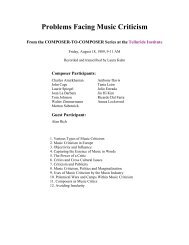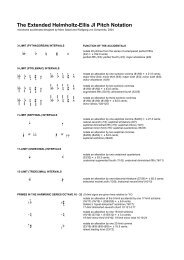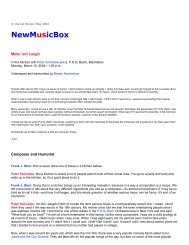Sixth World Symposium on Choral Music ... - NewMusicBox
Sixth World Symposium on Choral Music ... - NewMusicBox
Sixth World Symposium on Choral Music ... - NewMusicBox
Create successful ePaper yourself
Turn your PDF publications into a flip-book with our unique Google optimized e-Paper software.
New<strong>Music</strong>Box May 2003<br />
20. The Compositi<strong>on</strong>al Process<br />
AUDIENCE QUESTION: I have a questi<strong>on</strong> about process. When you are composing, are you<br />
working at a keyboard, or are you at a writing desk, or a table? Or do you use software and write<br />
with a keyboard?<br />
ALBERTO GRAU: The first approach is without a piano. I will take the text and organize<br />
whether to separate [it] into 2-3 parts. What are going to be the climatic points, the deep points?<br />
All the scheme is d<strong>on</strong>e at a desk. Then I use a piano for the melodic and harm<strong>on</strong>ic points to come<br />
out.<br />
JORGE CÓRDOBA: In my case, I am c<strong>on</strong>trary to Alberto. I think that a piece has a life of its<br />
own. Sometimes I need a piano to write it; sometimes I do not. I do not use software to write<br />
music. No two compositi<strong>on</strong>s of my own for choral performance have been written with the same<br />
process. Sometimes I just write it. Sometimes I use a piano. Sometimes I write bits and pieces<br />
and then compile the whole work. The basic idea is the intuiti<strong>on</strong>. That is the main process,<br />
intuiti<strong>on</strong>.<br />
STEPHEN PAULUS: I write at the piano. I use a Pentel rolling writer, which is basically a felttip<br />
pen, to do a complete draft. It doesn't matter if I make a mistake; I just cross it out. Then I<br />
hand it over to my copier who puts it <strong>on</strong> Finale, and sends me a final copy, and that's it.<br />
AUDIENCE QUESTION: I have a questi<strong>on</strong> related to the process. When you're thinking about<br />
what you're going to write… As a performer, I have had the experience of being given pieces that<br />
were fantastic, but also extremely difficult, and so, if you think about performability, that a piece<br />
may be at a level, what do you think about settings that take high-level forces, or large forces,<br />
knowing that it may not be performed as much as you might like?<br />
ALBERTO GRAU: I would like my music to be performed more—and of course to be bought<br />
more, but I insist <strong>on</strong> the fact that when you compose, you should think to whom you are<br />
composing for. Sometimes if something is extremely difficult, you as a composer should make it<br />
easier, if you see that the performer is not able to do it. But sometimes for respect of the<br />
instituti<strong>on</strong>, you have to do things harder, because the choir that is going to sing this deserves such<br />
an amount of difficulty.<br />
JORGE CÓRDOBA: In this case, I think that it is risky to think about the performer. That does<br />
not mean that I am opposed to Alberto's idea. I was commissi<strong>on</strong>ed in Mexico from very highlevel<br />
musicians. They talked to me and they actually got into my ideas of the compositi<strong>on</strong>s.<br />
They were in the process with me. No <strong>on</strong>e can sing those pieces besides them because they are<br />
too difficult, and that is why I think it is too risky to think about the performer for whom <strong>on</strong>e<br />
writes. In the case of the Norwegian choir that just sang my piece, I did not know the level of<br />
this choir, because I never talked to them before. That is why I wrote a piece that I think was not<br />
as complicated as it could be. It would be very risky to compose something very complicated,<br />
Composers’ Dialogue #1, 08/06/2002





